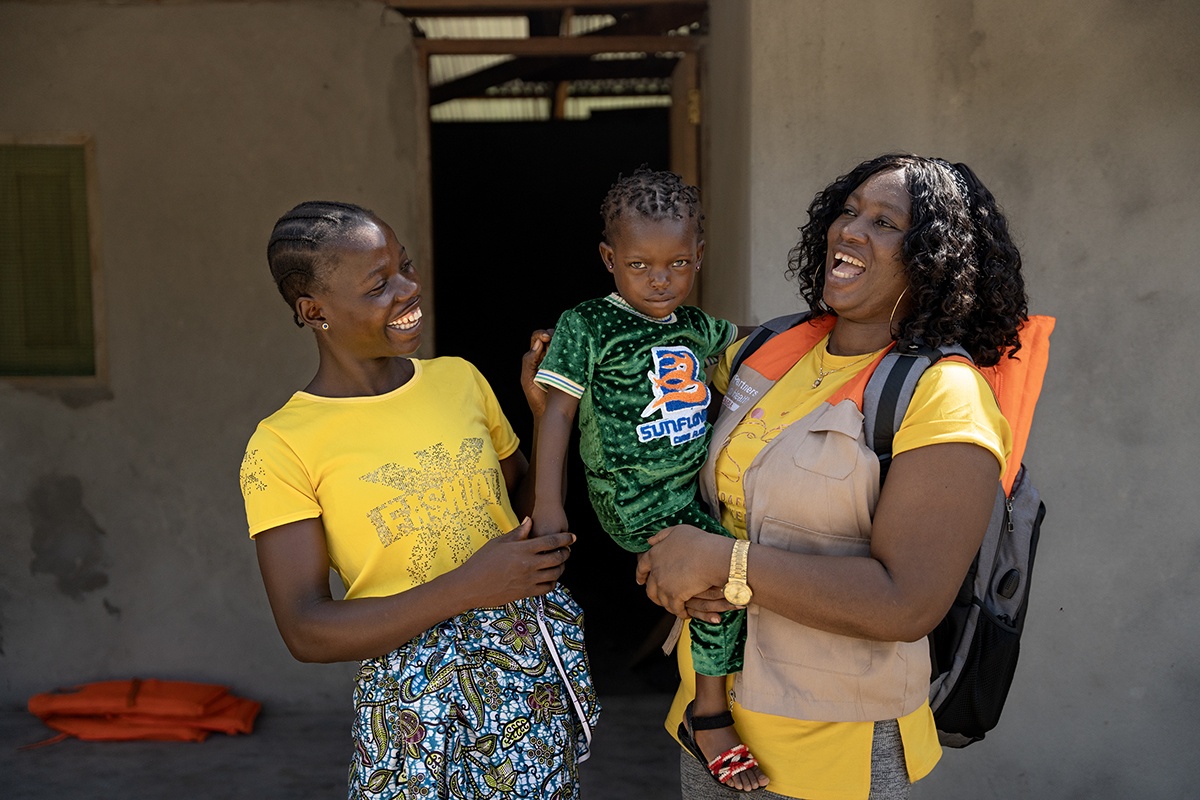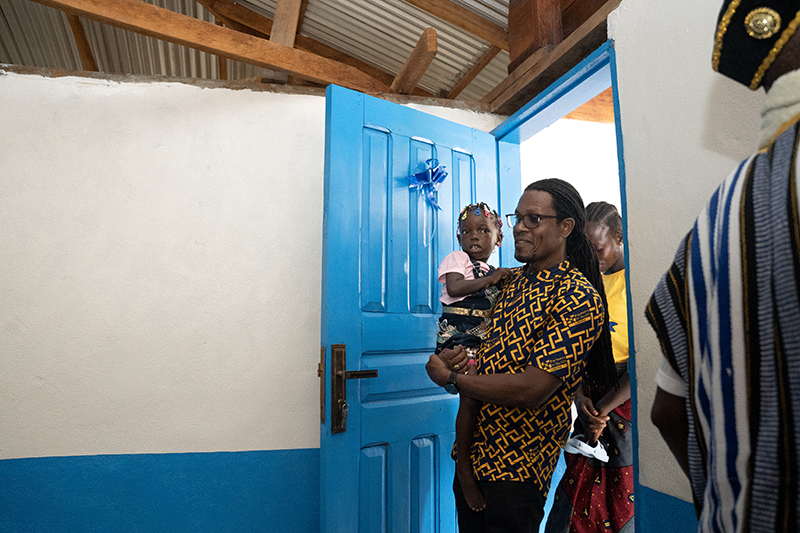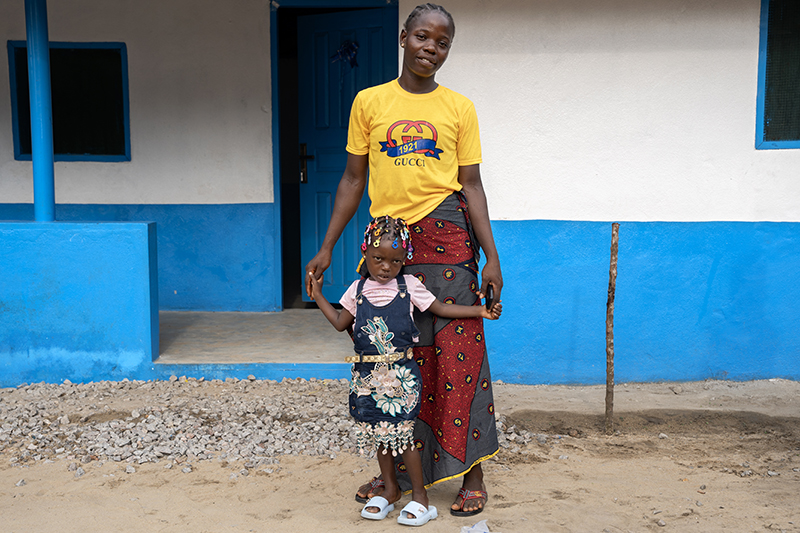A Home for Healing: How Social Support Helped a Liberian Girl Recover from TB
Secure housing is one of many factors that help patients living with TB recover and maintain good health
Posted on May 7, 2025

Four-year-old Pauline Baker enjoys playing on the porch of her new home — a blue and white structure with a corrugated roof — in Puluken, Liberia. After her diagnosis of multidrug-resistant tuberculosis (MDR-TB) in 2022, this home became crucial to Pauline’s survival.
In a country where TB impacts 308 per 100,000 people, and more than half the population lives below the poverty line, access to health care and safe housing remains out of reach for many.
For Pauline and her mother, Agatha, a single parent, these barriers made getting treatment and a successful recovery particularly challenging—but Partners In Health (PIH) Liberia and local community leaders in Maryland County stepped in to support the family.
The Role of Social Support in Recovery
Agatha and Pauline first crossed paths with Dr. Maxo Luma, executive director of PIH Liberia, one afternoon in March 2022. He and other members of PIH happened to be walking along the same sandy, tree-lined path to Puluken, across from the Hoffman River, to honor Dr. Paul Farmer, who’d passed away a few weeks earlier.
Agatha was carrying toddler Pauline, who was feeling unwell, on her back. Noticing Pauline’s coughing and rapid breathing, Luma approached Agatha. They spoke at the edge of the road, and he learned that Pauline also had an upset stomach, lacked appetite, and had enlarged lymph nodes. He provided Agatha with money for transport to nearby PIH-supported James Jenkins Dossen Memorial Hospital. The following day, a diagnosis was confirmed: Pauline had MDR-TB.
Agatha struggled to face the gravity of her young daughter’s diagnosis. “To talk true, I na know (Truth be told, I didn’t know) that sickness (tuberculosis), I was taking it to be malaria, ordinary cough and other small-small (minor) sicknesses that can come on the children,” she said.
At the time, she and Pauline were living with an uncle. While Agatha was grateful for the refuge his home provided, the living quarters often felt cramped, and she longed for a place to call their own. Following Pauline’s diagnosis, Agatha’s focus shifted not only to securing the treatment her daughter desperately needed but also to ensuring that their living environment would support a smooth, soothing convalescence.
Secure housing is a critical social determinant of health, particularly for those battling TB; overcrowded and unsanitary living conditions have been shown time and again to increase the risk of transmission and treatment failure. Aware of this imperative, Luma, who remained in touch with Agatha and Pauline and is a TB expert himself, made the critical decision to collaborate with Maryland County’s Health Team and the Puluken community to build a two-bedroom home where Pauline could safely recuperate.

“I was feeling happy and was praying for them to make it quick-quick (speedy) and finish the house,” said Agatha about hearing that PIH Liberia would provide her and Pauline with a new home.
This intervention was essential. Nine out of 10 residents in Maryland County live below the poverty line—and women and children with TB often delay treatment due to financial constraints, stigma, and limited mobility. With poverty exacerbating malnutrition and unsafe living conditions, interventions such as dignified housing are life-altering.
Tackling these factors head-on, PIH and its partners are working to break the cycle of poverty and disease. “Social medicine is not just about taking medicine because there are many social factors responsible for sickness,” said Dr. Seidoh Freeman, Maryland County Health Officer.
Community Collaboration and a New Chapter
Pauline’s new home marked a significant milestone for the Puluken community—standing as a symbol of hope and support for a mother and her child. During the ribbon-cutting ceremony, three years after their first meeting with Luma, Pauline and Agatha received the keys to their new home, and a jubilant crowd of neighbors gathered outside the freshly painted blue-and-white building.
“I was so happy that day, and now I am still happy because I got my own area (I have my own house),” Agatha said.
During the ceremony, two excited children ran onto the porch and picked up balloons nestled against the wall. "Batee o batee!" exclaimed Dr. Joia Mukherjee, chief medical officer at PIH. "Batee!" the crowd responded, their cheers growing louder as she repeated the local call-and-response phrase used at gatherings.
Mukherjee and Luma praised everyone involved in making the new home possible, and community leaders who were present also expressed their joy. “Since the house was completed, when strangers come, they ask me who the rich person is that owns this house,” said Puluken Town Chief Dweh T. Baker. “I tell them the owner is not even five years old.”
Adding to the speeches, Lancelot K. Wleh, chairperson of the Health Facility Development Committee in Harper, declared: “The community has requested that from today onwards, you are no longer Partners In Health. You are now Partners in Everything.”
As Mukherjee cut the yellow ribbon adorned with colorful balloons, the crowd surged forward, eager to step inside and celebrate Pauline and Agatha’s new chapter.

Today, Agatha and Pauline are happily settled in their new home, and the stable living quarters proved life-changing for Pauline, who no longer experiences MDR-TB symptoms.
“Pauline is fine,” said Agatha. “I na (I am not) seeing any sickness in her again, I thank God for it.”

